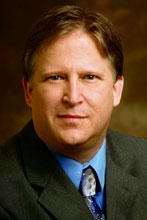
The American Psychological Association's board of directors has selected Paul Root Wolpe, director of Emory's Center for Ethics, to co-chair a special commission to review all of the association’s ethics processes and procedures.
Based in Washington, D.C., the APA is the largest scientific and professional organization representing psychology in the United States. Its membership includes more than 122,500 researchers, educators, clinicians, consultants and students.
“The commission will review APA’s educative and adjudicative functions related to ethics; potential conflicts in human rights considerations; and current policies, practices and procedures of the Ethics Office,” says APA President Susan H. McDaniel. “Further, the commission has been charged with benchmarking APA's Ethics Office processes with the ethics processes of other professional associations.”
The APA Council of Representatives approved the establishment of a commission to evaluate and recommend changes to APA's ethics processes as part of its adoption last August of a policy prohibiting psychologists from participating in national security investigations.
Melba J.T. Vasquez, a past president of APA (2011) and a private practitioner in Austin, Texas, will serve as the other co-chair of the commission, which includes 17 distinguished psychologists and ethics experts from other disciplines.
Nadine Kaslow, Emory professor of psychiatry and behavioral sciences and former president of the APA (2014), called the formation of the commission a critical step in the organization's process of self-reflection and organizational improvement in the aftermath of an independent review.
"It was essential that this commission include psychologists and non-psychologists with ethics experience," notes Kaslow, adding, "I can think of no non-psychologist in this country who is better suited than Dr. Wolpe to co-chair this very vital committee."
Wolpe says he is honored that the APA has asked him "to help them go through this important process of self-examination."
"They have put together a really impressive group of scholars and practitioners, and I am confident that we will work together productively and make recommendations to improve APA’s ethics procedures and structures," he says.
The commission is expected to complete its work in 2016, with a final report planned for February 2017.
Through its divisions in 54 subfields of psychology and affiliations with 60 state, territorial and Canadian provincial associations, APA works to advance the creation, communication and application of psychological knowledge to benefit society and improve people's lives.
